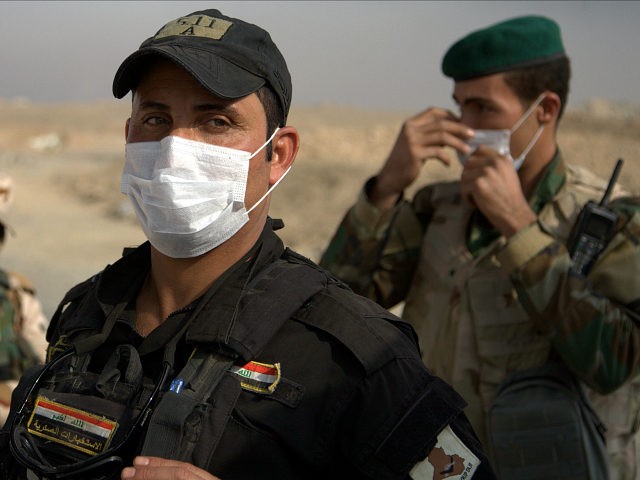A new study finds that the Islamic State has used chemical weapons 52 times in its “caliphate” in Iraq and Syria, following reports that fighters seeking to liberate the city of Mosul fear increased use of such weapons the closer the jihadists get to defeat.
The Washington Post cites the analytics organization IHS Markit as having published the report, which indicated that those 52 documented instances of chemical weapons use occurred in Iraq and Syria between 2014 and the present day.
In a press release announcing the new report, IHS Markit’s experts warn that, although the Islamic State’s control over much territory in Iraq has eroded, they remain in possession of facilities that contain toxic materials. “Medical and industrial sources of radioactive material are present within territory held by the Islamic State, for example, at the Hazim al-Hafid Hospital, a specialist oncology and nuclear medicine facility in Mosul,” Karl Dewey, CBR analyst at IHS Jane’s, is quoted as saying.
The report does show that there appears to have been a decline in the number of chemical weapons incidents since the operation to liberal Mosul began last month. The study documented 19 chemical attacks in and around Mosul in the past two years.
While the Islamic State has reduced the number of deliberate chemical attacks, it has not stopped using chemicals to poison the environment and hurt both enemy ground troops and fleeing civilians. In late October, the jihadist group set fire to a chemical plant and sulfur mine just outside of Mosul, releasing tons of toxic waste into the air and causing severe anguish to civilians exposed to the poison.
In September, before the operation to liberate Mosul began, a Pentagon spokesman warned that U.S. troops cooperating with Iraqi soldiers and ethnoreligious militias in the Mosul siege were likely to be ISIS’s top target. “We recognize this is real. They’re dead set on it. They would love to be able to use chemical weapons against us, against the Iraqis as they move forward,” U.S. Navy Capt. Jeff Davis said at the time. He noted that U.S. troops are preparing for the possibility and expecting “irritants,” but not deadly gases.
Iraqi Kurdish militia leaders also warned, at the time, that they had seen an increase in attempts to use chemicals to hinder troops.
Since then, U.S. aircraft have targeted and destroyed at least one major Islamic State chemical weapons plant. U.S. Air Force Central Command head Lt. General Jeffrey Harrigian told reporters that he believes the plant specialized in making chlorine or mustard gas, which echoed reports of such chemicals deployed on the battlefield against Kurdish Peshmerga.
Despite this victory, NGOs have warned that the Islamic State may turn to using such chemicals at a greater frequency as their grip on Mosul loosens. The International Organization for Migration (IOM) has warned that preparing civilians for a chemical attack should be a major humanitarian priority. “We also fear, and there has been some evidence that ISIL might be using chemical weapons. Children, the elderly, disabled, will be particularly vulnerable,” IOM Iraq chief Thomas Weiss has warned.
The Islamic State are far from the only actors in Syria and Iraq using chemical weapons. Despite President Barack Obama’s “red line” speech threatening consequences for Syrian dictator Bashar al-Assad if his government deployed chemical weapons, and a Russian-lead operation to allegedly disarm Assad of those weapons, NGOs and UN agencies have warned that Assad has continued to use and manufacture chemical weapons as recently as last September.
Last year, the UN’s Organization for the Prohibition of Chemical Weapons (OPCW) warned that the use of chemical weapons in Syria “is becoming routine.”
This week, the UN Security Council voted to allow the Joint Investigative Mechanism (JIM), a group of chemical weapons inspectors, to keep working in Syria. It is unclear what the inspectors have done, if anything, to prevent the use of chemical weapons.

COMMENTS
Please let us know if you're having issues with commenting.